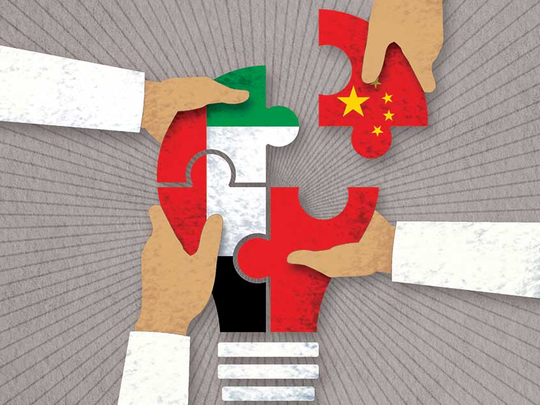
The UAE’s ‘Looking East’ policy, with focus on China and building strategic relations with the giant Asian country, is a step in the right direction. While the UAE is keen to create a balance in its global relations, especially with the US and Europe, it is increasingly adopting a steady approach of strengthening ties with the East.
This policy is based on the UAE’s unchanged strategy of maintaining diverse relations and not putting all its eggs in one basket. The strategy has served and will continue to serve the country’s interests and reflect positively on security, economic and political domains.
This strategy, reflected by the recent visit to China by His Highness Shaikh Mohammad Bin Zayed Al Nahyan, Crown Prince of Abu Dhabi and Deputy Supreme Commander of the UAE Armed Forces, was laid by the late Shaikh Zayed Bin Sultan Al Nahyan.
UAE-China relations have developed over time, as the UAE’s leadership has reaffirmed the strategic importance of China in the international scene, economically and politically.
What do we want from China specifically? The agreements signed during Shaikh Mohammad’s recent visit provide us with the answers. During the visit, the two countries signed a range of diverse agreements on investment, energy, education and diplomacy, among others.
Among these agreements is the setting up of a $10 billion UAE-China joint strategic investment fund, which will further strengthen the economic and political ties between the two nations. The amount of $10 billion will be paid equally and is expected to be increased in the next few years.
The strategic fund will be allocated to support joint investment ventures in industries, semi-connectors, smart technology, aviation and infrastructure. Both parties will examine rewarding and long-term projects that can generate revenues and bring about a qualitative leap in the economies of the UAE and China.
The idea of establishing the fund was raised by the UAE during Shaikh Mohammad’s previous visit to China in 2012. This simply means that the UAE is not only keen to develop strategic relations with China, but also to make the most of China’s huge scientific and industrial potential as well as of the accumulated Chinese expertise.
This initiative reveals that the UAE is serious in its approach toward strengthening relations with China, based on real actions on the ground represented by achievements and joint ventures.
This is because such achievements can maintain the UAE-China strategic relationship and take it to greater heights that look like a long-term strategic alliance.
Promoting peace
In view of the current scene in the Middle East, China will not find a strategic alliance better than the UAE, which impressed the Chinese leaders with its economic accomplishments, growth, stability and its contributions to promoting peace in the world and supporting major projects that benefit the entire world.
These contributions are clearly manifested in the UAE’s commitment to clean and renewable energy that is exemplified in adopting a progressive energy strategy.
China’s admiration for the UAE’s experience is clearly visible and is reflected by Beijing’s openness to the UAE by making it a vital gateway for its goods to regional and international markets.
Furthermore, China’s open skies aviation policy, which allows UAE commercial flights and carriers to Chinese cities, is evidence of the progressive relations.
Also, it is more likely that China will grant Emirati airlines the rights to fly on to more Chinese cities in the near future, apart from the growth of traffic between the two countries. The UAE is also home to a large active Chinese community that works in the areas of trade and export.
DP World’s management of a number of Chinese ports also provides more solid proof of the Emirati expertise in this field, highly trusted by the Chinese.
Such expertise will help develop cooperation further and set up joint ventures to serve the flow of goods and exports from China into international markets, such as the setting up of industrial areas and ports for the movement of Chinese goods.
Hence, the relationship with China is unlike any other. China is a great country with huge potential and a powerful economy.
The more the UAE’s relationship with China grows stronger, the more economic, political and investment benefits there will be.
For example, the visa entry waiver granted by the UAE to Chinese diplomats may seem a small step, but it is not for China, whose diplomats count for more than 1.5 million. This means a new income for the UAE as those diplomats will travel via national carriers and make stops at UAE airports through their travels across the world, or even for tourism or shopping.
Therefore, the visit, which will also boost the trust between the UAE and China and serve their mutual interests, is a step in the right direction at the right time, to build a strategic partnership and create a balance in international relations.
This will reflect on more stability and security in our region and serve our country and our neighbours, especially the GCC countries.
No doubt that China’s emphasis on the importance of the UAE’s security and stability is the first sign on this path.










